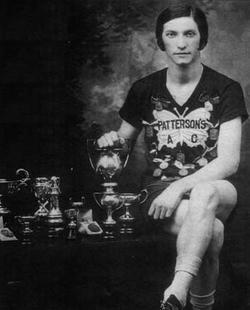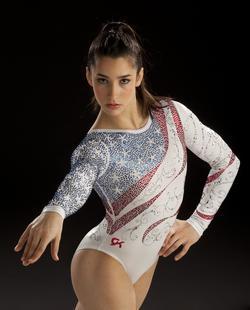Olympians
Bobbie Rosenfeld and Aly Raisman may both have won Olympic gold against fierce competition, but they competed in vastly different worlds. Rosenfeld spent her career arguing that women could and should be athletes, while Raisman grew up in a time when Title IX was a given, granting female athletes to the same access and support as male athletes in state schools and competitions. Raisman gave gymnastics her complete focus, while Rosenfeld played almost every professional sport that existed in her time. The differences between Rosenfeld’s career and Raisman’s say as much about the evolution of sports in general as they do about women in sports.
Of the legendary Bobbie Rosenfeld, one sports commentator joked that the easiest way to sum up her career was “to say that she was not good at swimming.” Rosenfeld played professional basketball, ice hockey, tennis, and lacrosse, competed in speed skating and javelin and discus throwing, and won Olympic gold and silver for track. When she played professional softball, she doubled as both a player and manager for the Maple Leafs, a women’s softball team, taking them all the way to national championships.
All of this speaks to her amazing versatility as a player, but it was also made possible by the fact that sports (and athletes) were not yet so specialized—in the 1920s, the idea of searching remote parts of the globe for runners born with better leg muscles, crafting special shoes and gear to cut down on wind resistance, and funding an athlete to spend all day every day training for a race was unheard of. Bobbie supported herself as a stenographer, wore her brother’s swim trunks to her first track meet for lack of a uniform, showed up on the day of a meet or game and played her heart out. Once she proved that she was an athlete, she could define what that meant for her because the rules and expectations for athletes weren’t yet set in stone.
After early retirement, Bobbie Rosenfeld became a sports commentator, arguing that audiences needed to pay more attention to women athletes. She encouraged women to take joy in what their bodies could do and what their determination could accomplish, instead of worrying that sports would ruin their health or destroy their femininity. In her writing, as much as by her performance on the playing field, she helped shape new possibilities for women in sports.
Aly Raisman began her training almost as soon as she could crawl: she started doing gymnastics as a toddler during Mommy and Me classes and spent her childhood and young adulthood perfecting her skills. Women athletes are no longer a novelty, they’re a given in nearly every sport, and competition couldn’t be more fierce. Aly Raisman’s passion for gymnastics and her single-minded focus on training were crucial to her success at the 2012 Olympics, where she won two gold medals and one bronze.
Raisman was awarded top honors for her perfectly executed floor routine, the most complex of that year’s competition, making her the first American woman to win the gold medal for a floor routine. But Raisman also infused her gymnastics with both her personal flair and her Jewish values, performing some of her best routines to “Hava Nagila” and dedicating her performance at the Olympics to the memory of the Israeli athletes slain in Munich forty years earlier. Virtually unknown before the Olympics, she became a national hero and one of the stars of the 2012 Games with her winning combination of determination and vitality.
Due to the physical strain of competition, Raisman took a year off after the Olympics. While she has discussed her desire to train for the 2016 Olympics, she has also needed to think about a second career post-Olympics. It’s clear that Raisman’s talents offer her a stunning array of possibilities: so far, she’s competed on Dancing with the Stars, volunteered with the Special Olympics, and become a spokesperson for various organizations, and there’s no telling what she’ll do next.




